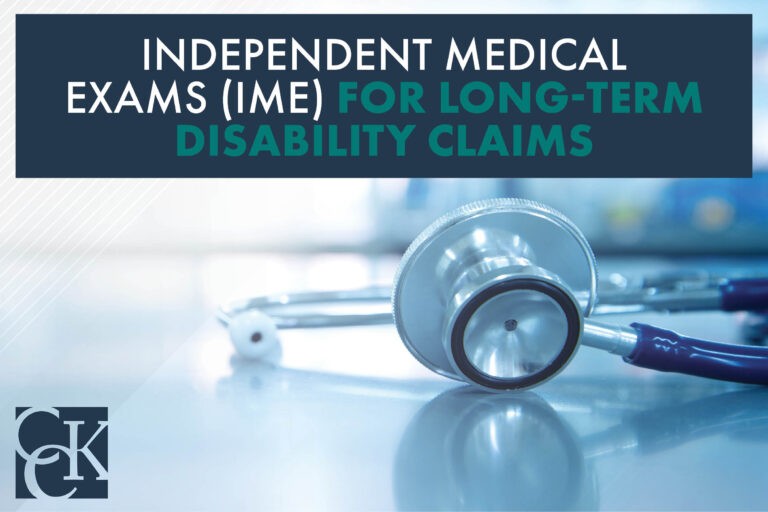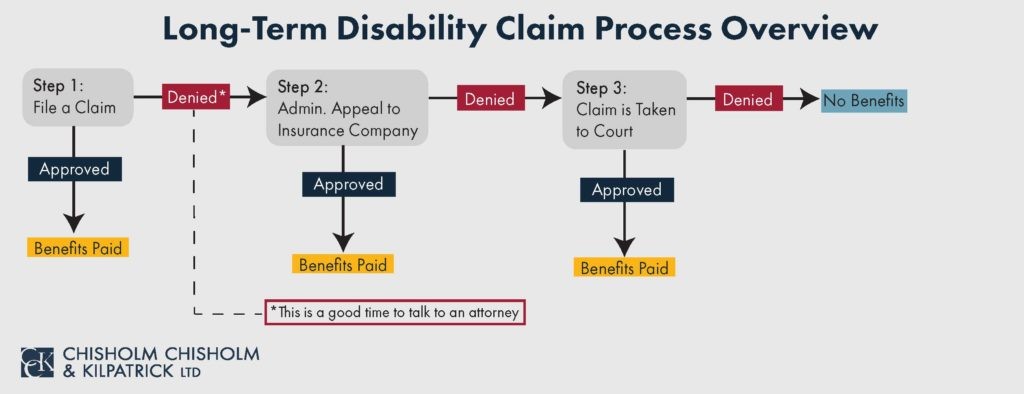Independent Medical Exams (IME) for Long-Term Disability Claims

Filing for long-term disability benefits is often stressful for insured employees who develop a debilitating medical condition. There is a myriad of issues they may face, including the waiting period, the maximum benefit period, and others. One of the most common issues that LTD claimants face is when their insurer requests that they attend an independent medical exam (IME).
If you are receiving long-term disability (LTD) benefits, then the insurance company will periodically review your claim to determine if you continue to meet the applicable definition of disability. Often, this will involve obtaining your medical records and forms from your doctors to be reviewed by a nurse or doctor who works for the insurance company. However, your insurer may ask you to attend an examination with a doctor of their choosing (i.e., the IME).
Attending an independent medical exam for disability benefits can be challenging. Your insurer requests these to determine what your functional impairments are and thus whether you continue to meet the definition of disability. However, although these exams are labeled “independent” and performed by someone outside of the insurance company, there are several things you should be aware of if your long-term disability insurer wants to send you for an IME. This article will address these questions.
Is an Independent Medical Exam (IME) Actually Independent?
Although independent medical exams are labeled “independent,” in most cases, the doctor performing the exam is not truly independent because the insurance company is paying for the exam. Independent medical exam doctors may perform a large number of IMEs; if so, then they may derive a substantial portion of their income from insurance companies, and they may be incentivized to keep insurance companies happy and help them avoid paying long-term disability benefits. Unfortunately, this can result in biased exams and reports that do not accurately reflect your medical condition and impairments.

You can request the medical provider’s curriculum vitae (CV) before the IME appointment. The provider’s CV may indicate that the provider completes these exams regularly for insurance companies. This could be indicative that the provider is more likely to find you not disabled so that they can acquire additional work from the insurance company.
Although regularly conducting IMEs is not a definitive indicator that the provider will be biased, it is important to keep this in mind. You should consider contacting an attorney if the insurance company wants you to attend an IME and you are concerned about the exam provider’s neutrality.
Is an IME Appropriate for My Disability?
Claimants may wonder how long an independent medical exam takes and what an independent medical exam consists of. IMEs are brief. Usually, they only last for about an hour. In this time, the physician will interview you about your medical history and perform a short physical exam. For many claimants, this one-time, brief exam is not sufficient to fully and accurately determine their functional impairments. This is especially true if your disability is due to medical conditions that cause chronic pain or fatigue, e.g., fibromyalgia and chronic fatigue syndrome.
Individuals who suffer from these conditions may be able to perform some activity but not on a reliable and consistent basis for several hours per day or multiple days per week. Thus, the brevity of an IME will not accurately reflect their functional impairments or ability to work. Yet most insurance companies do not consider whether an IME accurately reflects your disability when they ask you to attend one.
How to Prepare for an Independent Medical Exam (IME)
Before you attend the scheduled IME, you should gather your medical records on your own and bring them to the appointment to ensure that all of the relevant information is being presented to the doctor. You should not rely on the insurance company to send the appropriate medical records on your behalf. Failing to provide the doctor with medical records yourself can result in the doctor having a skewed evaluation of your past medical history.

To further ensure that the appointment is as unbiased as possible, you can request to bring a witness to the exam who can later attest to the contents and results of the appointment. Additionally, you should request a copy of the doctor’s report following the exam. This will allow you to identify any discrepancies between what occurred during the exam and the report the doctor submitted to the insurance company.
It is also important to understand what not to say at an independent medical exam. Do not exaggerate your symptoms or play down how your condition affects you. It is also essential to disclose all prior injuries. If you willfully conceal past injuries and your insurer finds out, then you will lose credibility and may face a denial of your claim. Remember, insurance companies do not want to approve LTD claims if they can help it, so they will use whatever they can to justify issuing a denial.
Can I Decline to Participate in an Independent Medical Exam?
Generally, if the insurance company asks you to attend an IME, then you must do so. Most long-term disability policies have provisions that require you to cooperate with the insurance company in their assessment of your claim. As a result, declining to participate in the IME could cause your claim to be terminated or denied.

You can sometimes argue that an IME should not be necessary and that you have provided enough medical documentation for the insurance company to make a decision, but if the insurance company continues to insist that you attend the IME, refusing to attend can be detrimental to your claim. You should consider contacting an attorney if you are scheduled for an IME and think you have already supplied enough information.
Moreover, long-term disability insurance benefits can protect your income when you become unable to work for an extended period due to an illness or injury. As such, claimants want to ensure that they give their claim the best chance of receiving an approval from the insurance company. By declining to attend an IME, a claimant can put their entire claim into question and may not receive benefits as a result. Therefore, it is best to comply with whatever requests the insurance company sends you.
Contact CCK Today for a Free Case Evaluation
At Chisholm Chisholm & Kilpatrick, our team of attorneys and professionals has assisted clients throughout the long-term disability claim process for over 20 years. We understand that being scheduled for an IME is stressful and can potentially jeopardize your claim. If you have long-term disability coverage and are filing a claim and have received a request to attend an IME, it is best to consult with an LTD attorney who can help you receive these all-important monthly benefits without needing to appeal.
If your long-term disability insurer has scheduled you for an IME and you are concerned about the impact it will have on your LTD claim, we may be able to help you. Whether you have an ERISA-governed policy or an individual policy, we have the knowledge to help you navigate this process. Call CCK today at (800) 544-9144 for a free case evaluation. A member of our team will analyze your case and determine if we can assist you.

About the Author
Share this Post
